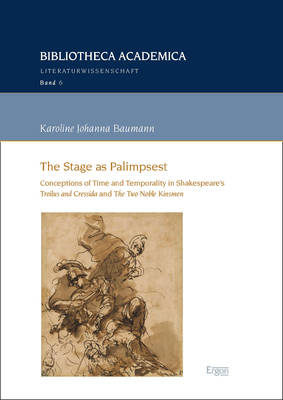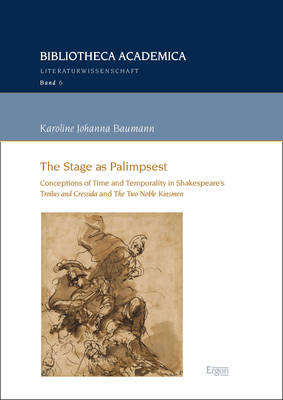
Bedankt voor het vertrouwen het afgelopen jaar! Om jou te bedanken bieden we GRATIS verzending (in België) aan op alles gedurende de hele maand januari.
- Afhalen na 1 uur in een winkel met voorraad
- In januari gratis thuislevering in België
- Ruim aanbod met 7 miljoen producten
Bedankt voor het vertrouwen het afgelopen jaar! Om jou te bedanken bieden we GRATIS verzending (in België) aan op alles gedurende de hele maand januari.
- Afhalen na 1 uur in een winkel met voorraad
- In januari gratis thuislevering in België
- Ruim aanbod met 7 miljoen producten
Zoeken
The Stage as Palimpsest
Conceptions of Time and Temporality in Shakespeare's "Troilus and Cressida" and "The Two Noble Kinsmen"
Karoline Johanna Baumann
€ 32,45
+ 64 punten
Omschrijving
This study shows that Shakespeare's plays challenge a system of periodization that divides history into three distinct eras (antiquity, the Middle Ages, modernity). In Troilus and Cressida and The Two Noble Kinsmen, several conceptions of time and temporality are played through in a way that shows that the idea of linear time and progressive, teleological history upon which our concept of periodization is based, is inadequate to the complexities of temporal relations. Instead, these plays, being based on ancient sources that were rewritten many times throughout the Middle Ages and the Renaissance, suggest an understanding of time that is best expressed with the help of the metaphor of the palimpsest. A palimpsest contains multiple temporal layers that are entangled and interwoven without hierarchy rather than successively or chronologically arranged. The question of period construction is thus posed performatively in these plays, with a special focus on the invention of the Middle Ages.
Specificaties
Betrokkenen
- Auteur(s):
- Uitgeverij:
Inhoud
- Aantal bladzijden:
- 160
- Taal:
- Engels
- Reeks:
- Reeksnummer:
- nr. 6
Eigenschappen
- Productcode (EAN):
- 9783956504655
- Uitvoering:
- Paperback
- Afmetingen:
- 170 mm x 240 mm
- Gewicht:
- 319 g

Alleen bij Standaard Boekhandel
+ 64 punten op je klantenkaart van Standaard Boekhandel
Beoordelingen
We publiceren alleen reviews die voldoen aan de voorwaarden voor reviews. Bekijk onze voorwaarden voor reviews.









